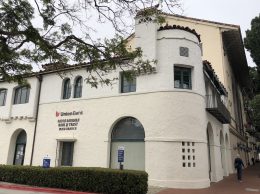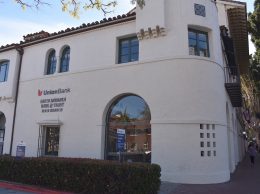Prosecutors allege Deckers, Pacific Capital victims of KPMG auditor’s leaks
IN THIS ARTICLE
- Banking & Finance Topic
- Staff Report Author
By Staff Report Thursday, April 11th, 2013
Deckers Outdoor Corp. and the former Pacific Capital Bancorp, two of the biggest names in tri-county business, were the targets of a KPMG auditor who leaked their financial information to a golf partner and now faces federal criminal insider trading charges, according to prosecutors.
Scott London, a former partner in charge of the accounting firm’s regional audit practice, was charged by the U.S. Securities and Exchange Commission and the Justice Department with passing along earnings and financial information about Deckers, Pacific Capital and three other companies to Bryan Shaw before that information was available to the public. Shaw, a jewelry store owner and country club friend of London’s, allegedly used that information to reap $1.27 million in illicit profits and repaid London with $50,00 in cash and a Rolex watch, according to the complaints.
Publicly traded companies must release their financial information to the entire public at once so that all investors have an equal chance to act on it. But federal prosecutors allege that Shaw received inside information about Goleta-based Deckers and Pacific Capital Bancorp, the former parent of Santa Barbara Bank & Trust and now part of Union Bank, before it was available to other investors.
Businesses routinely provide their auditors with confidential financial information, and Deckers and Union Bank are not accused of any wrongdoing. Union Bank declined to comment, and Deckers did not immediately return a request for comment.
“Mr. London chose to betray the trust placed in him as a financial auditor and to tip the trading scales for the benefit of insiders like himself,” U.S. Attorney Andre Birotte Jr. in Los Angeles said in a statement.
In the case of Deckers, prosecutors allege that London leaked information about quarterly earnings reports four times. On the first two occasions, Shaw intercepted positive news and used it to buy call options, a contract that profits when a stock’s price rises. On the second two occasions, London passed on information ahead of earnings reports that caused Deckers shares to plummet 14 percent and 25 percent, respectively. In those cases, Shaw purchased put options, contracts that profit only when a stock’s price drops, according to the complaint.
In the case of Pacific Capital, Shaw allegedly received a tip from London “sometime in early February 2012” about its upcoming merger with Union Bank, a fast-moving deal that surprised most observers in the Tri-Counties. Between Feb. 8 and March 9, 2012, the lawsuits allege, Shaw bought 12,225 shares of Pacific Capital and 120 call options. When Union Bank and Pacific Capital announced the deal, the share prices skyrocketed 57 percent in one day. Prosecutors allege that Shaw reaped a profit of at least $365,000 on his Pacific Capital share trades.
According to prosecutors, London said he began to help his country club friend with stock tips in 2010 after Shaw’s jewelry store struggled during the recession. Shaw allegedly repaid London $50,000 in cash, handed over in bags outside Shaw’s jewelry store, and with a Rolex watch valued at $12,000.
KPMG immediately terminated London when it learned of the investigation, and cut ties with Sketchers USA and Herbalife, two of the other firms whose information London allegedly leaked. Pacific Capital’s shares ceased to trade publicly after the Union Bank deal, and it’s unclear whether Deckers will maintain its relationship with KPMG.
London’s attorney, Harland Braun, told Bloomberg News that London plans to plead guilty.
For his part, Shaw began cooperating with law enforcement officials in February and recorded several in-person meetings with London.
“Over the past several months, I have fully cooperated with the FBI, the SEC, and the U.S. Department of Justice in their ongoing investigation of this matter,” Shaw said in a statement released to multiple news agencies. “I expect that my actions will result in significant civil and criminal consequences, but I realize that this is the painful price I will pay for my transgressions.”
Related Articles
 Friday, September 24th, 2021
Friday, September 24th, 2021
Dubroff: U.S. Bank’s big buy revives long-simmering rivalry with Wells Fargo
 Tuesday, September 21st, 2021
Tuesday, September 21st, 2021









